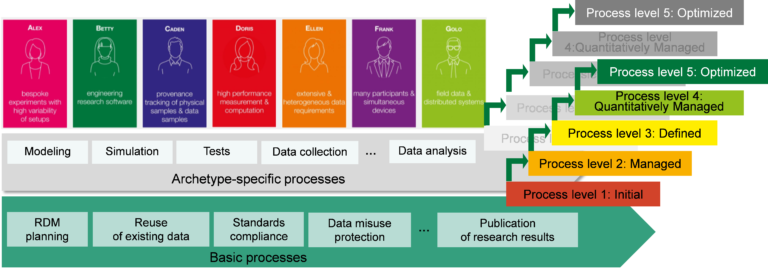introducing the base service measure S-1:
quality assurance in RDM processes and metrics for FAIR data
In this measure, we develop a framework to provide standards, metrics, and guidance for the organization of data curation. The framework incorporates existing best practices and the FAIR data principles. We begin with creating a common research data management maturity model and special models for each of the NFDI4Ing archetypes.
One important and well-established tool for quality assurance in RDM is data management planning (DMP). Within the measure, the development of an open source Research Data Management Organiser (RDMO) software and a DMP service are being carried out. Archetype and sub-discipline-specific DMP templates are being created, and we investigate how to support researchers and local RDM offices by designing a DMP review service based on the respective maturity level.
For the FAIRness of engineering data, management metrics and key performance indicators are being developed. The metrics and identifiers are based on certain recognized and operationalized goals and form the basis for a self-assessment at the institutional level, which subsequently can be utilized to track performance, benchmark RDM performance comprehensively, and impose RDM by performance incentivisation.
key challenges & objectives
The purpose is to assist and support researchers in organizing and self-monitoring research data processes to ensure and control data quality. All archetypes and communities rely on data quality assurance processes, the respective tools, and data quality metrics to make their data FAIR and to enable engineers to appraise and select data for further curation.
To assure data and process quality, a commonly agreed set of criteria will be defined that is valid not only for the engineering community but for the scientific community as a whole.
tasks
The measure S-1 includes four tasks.
Within the scope of the Task “Development of research data management maturity models”, a model for the organization of research data management processes is being designed. Depending on the type of the research project, the model can be used for self-control in small research projects or for the management of large projects to organize and motivate work with research data in and between subprojects.
The purpose of the Task “Data management planning with RDMO” is to organize and support the planning by means of RDMO software. It provides a highly adaptable user interface, authorization procedures and customizable DMP templates, which allow an effective and easy collaborative data management planning in multi-institutional research projects.
The task “Fostering DMP templates in engineering” designs, examines and evaluates archetypes and sub-discipline specific DMP templates for different stages of research projects as well as in close collaboration with all archetypes and community clusters.
Within the task “Providing and utilizing FAIR data metrics” FAIR data metrics and KPIs relevant to the FAIRness of the engineering data are being identified concerning general and already established research performance KPIs. Finally, a FAIR key-figure system will be developed. This will be done in close collaboration with CC41 to ensure participation in the author-critic cycle and acceptance in the engineering community.
results
RDM Framework
The RDM Framework and Maturity Model under development is a tool for control and self-monitoring to provide a set of recommendations to achieve the quality level of data management processes and the quality level of data. The first version takes into account the basic process characteristics of certain research projects and processes specific for archetypes (see Fig. S-1). These processes are assigned to generic and specific goals and define the degree to which a set of characteristics of data fulfills requirements and which will be described and achieved by best practices, self-control criteria, checklists and metrics.
Implementation of data management planning with RDMO
An establishment of an NFDI4Ing client in RDMO and the possibility to create data management plans for every researcher with DFN-AAI identification are realized and an engineer-specific guide for data management plans is developed.
More information: https://rdmorganiser.github.io/
contact information
The measure S-1 is lead by:
Prof. Dr.-Ing. Roland Lachmayer
Institute of Product Development
Leibniz University Hannover
Phone: +49 511 762 3471
lachmayer@ipeg.uni-hannover.de
The task leads are:
RDM maturity models
Max Leo Wawer
Institute of Product Development
Leibniz University Hannover
wawer@ipeg.uni-hannover.de
University and State Library Darmstadt
rdmo@nfdi4ing.de
DMP templates in engineering
Daniela Hausen
University Library RWTH Aachen University
hausen@ub.rwth-aachen.de
FAIR data metrics
Mario Moser
Laboratory for Machine Tools and Production Engineering (WZL)
RWTH Aachen
m.moser@wzl.rwth-aachen.de

